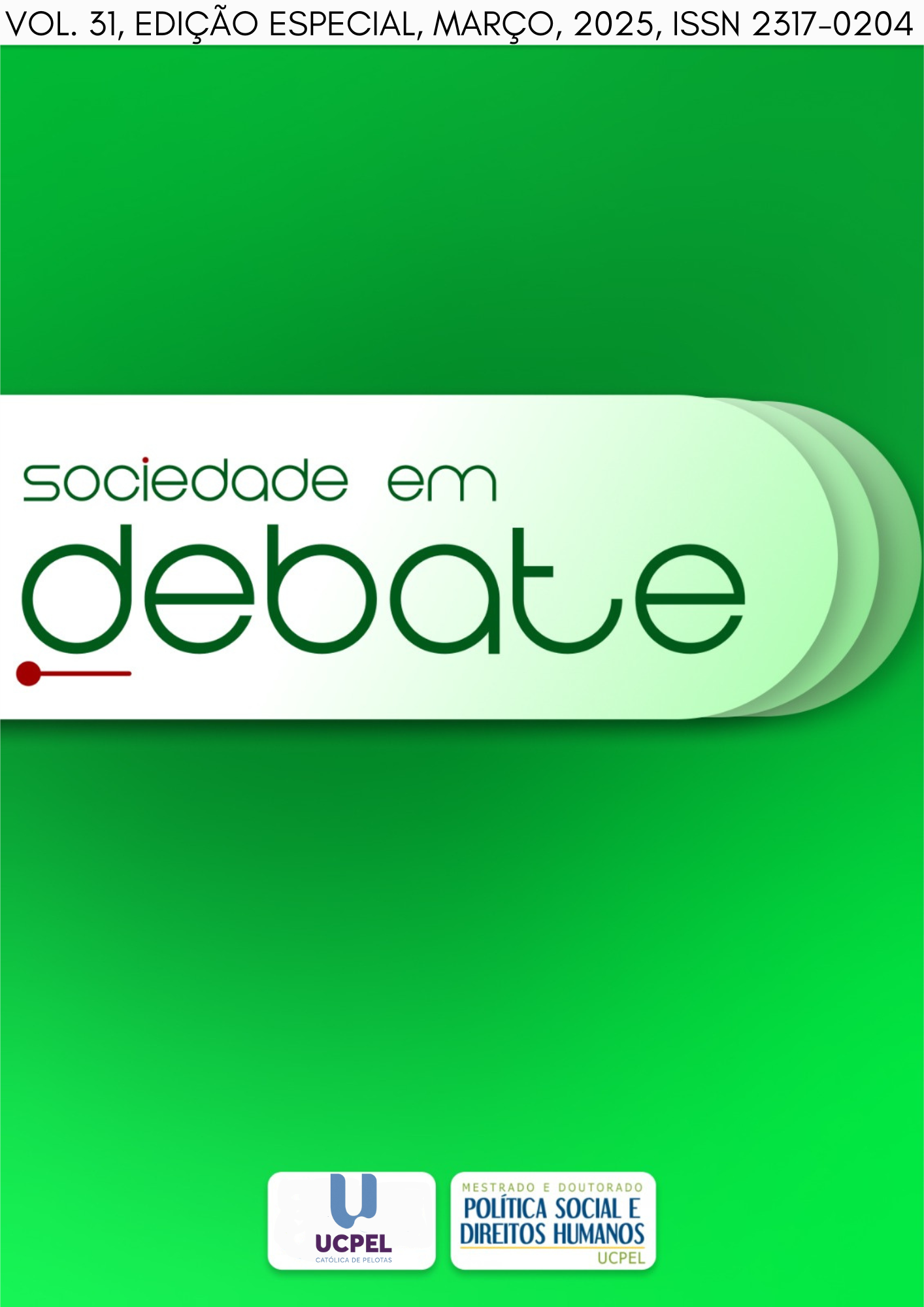Elaboração de recursos educacionais acessíveis: conhecimentos e práticas de profissionais da EAD
DOI:
https://doi.org/10.47208/sd.v31iEd.%20Esp..3648Palabras clave:
Educação de pessoas com deficiência auditiva, e-Acessibilidade, Tecnologia Assistiva, Educação a distânciaResumen
Este estudo investigou os conhecimentos e práticas de 21 elaboradores de recursos educacionais digitais (REDs), da Universidade Aberta do Sistema Único de Saúde da Universidade Federal do Maranhão, para pessoas com deficiência auditiva/surdez. Utilizou-se questionário on-line para a coleta de dados sociodemográficos e informações sobre o conhecimento e aplicação de critérios de acessibilidade. A maioria dos profissionais conhecia os critérios gerais de acessibilidade para produção de REDs, mas não as diretrizes específicas para esses recursos. Eles sabiam que a falta de uma janela para tradução em Libras compromete a compreensão e que, em vídeos, o quadro de tradução deve estar no canto inferior direito da tela. Também reconheciam que a ausência de legendas em vídeos dificulta a compreensão. A maioria não utilizava validadores automáticos. Os resultados evidenciam um amplo conhecimento dos critérios de acessibilidade, comprometimento com práticas de acessibilidade e inclusão, e a necessidade de capacitação permanente na área.
Descargas
Citas
ABED. ASSOCIAÇÃO BRASILEIRA DE EDUCAÇÃO A DISTÂNCIA. Censo EAD- 2022/2023. [S. l.], 2024. Disponível em: https://www.abed.org.br/site/pt/midiateca/censo_ead/2309/2024/05/censoeadbr_-_2022/2023. Acesso em: 8 ago. 2024.
ALVES, Elizabete Gonçalves; FRASSETTO, Silvana Soriano. Libras e o desenvolvimento de pessoas surdas. Aletheia, Canoas , n. 46, p. 211-221, abr. 2015 . Disponível em <http://pepsic.bvsalud.org/scielo.php?script=sci_arttext&pid=S1413-03942015000100017&lng=pt&nrm=iso>. acessos em 01 ago. 2024.
APARECIDA, Vanessa et al. PRINCÍPIOS DO DESIGN INSTRUCIONAL NA EDUCAÇÃO ESPECIAL. Revista Ilustração, [s. l.], v. 5, n. 7, p. 139–153, 2024. Disponível em: https://journal.editorailustracao.com.br/index.php/ilustracao/article/view/354. Acesso em: 19 ago. 2024.
BACELAR, Ananda Silveira Bacelar et al. Gênero e Construcionismo Social: Os Desafios das Mulheres na Tecnologia da Informação. Revista de Administração IMED. [S. l.], 2021. Disponível em: https://seer.atitus.edu.br/index.php/raimed/article/view/4364/2867. Acesso em: 13 ago. 2024.
BARROS, Daniela Melaré Vieira; GUERREIRO, Aníbal Martins. Novos desafios da educação a distância: programação e uso de Chatbots. Revista Espaço Pedagógico, [s. l.], v. 26, n. 2, p. 410–431, 2019. Disponível em: https://seer.upf.br/index.php/rep/article/view/8743. Acesso em: 8 ago. 2024.
BRASIL. Lei nº 10.436, de 24 de abril de 2002. Dispõe sobre a Língua Brasileira de Sinais - Libras e dá outras providências. Brasília: DF, 2002.
BRASIL. PRESIDÊNCIA DA REPÚBLICA. CASA CIVIL. SUBCHEFIA PARA ASSUNTOS JURÍDICOS. Lei no 13.146, de 6 de julho de 2015. Institui a Lei Brasileira de Inclusão da Pessoa com Deficiência (Estatuto da Pessoa com Deficiência), 2015.
Guia de Boas Práticas para Acessibilidade Digital. [s.l: s.n.]. Disponível em: <https://www.gov.br/governodigital/pt-br/acessibilidade-digital/guiaboaspraaticasparaacessibilidadedigital.pdf>.
Guia de Boas Práticas para Acessibilidade Digital. Disponível em: <https://ceweb.br/projetos/bruk/guia-html/>.
MACHADO, G. P. et al. Mulheres de TI em um Mundo Masculino: percepções dos homens sobre a atuação do gênero feminino no mercado de trabalho. Anais do Computer on the Beach, v. 12, p. 285–292, 29 abr. 2021. Disponível em: <https://www.porsinal.pt/index.php?ps=artigos&idt=artc&cat=23&idart=72>. Acesso em: 1 ago. 2024.
MELO GOMES, Luis Carlos et al. DESIGN INSTRUCIONAL NA EDUCAÇÃO. Revista Amor Mundi, [s. l.], v. 5, n. 4, p. 105–114, 2024. Disponível em: https://journal.editorametrics.com.br/index.php/amormundi/article/view/456. Acesso em: 19 ago. 2024.
NÚCLEO DE INFORMAÇÃO E COORDENAÇÃO DO PONTO BR. ACESSIBILIDADE E TECNOLOGIAS: um panorama sobre acesso e uso de Tecnologias de Informação e Comunicação por pessoas com deficiência no Brasil e na América Latina. São Paulo: [s. n.], 2020. Disponível em: https://cetic.br/media/docs/publicacoes/7/20200521062327/estudos-setoriais-acessibilidade-e-tecnologias.pdf. Acesso em: 19 ago. 2024.
SANTOS, Carlos Eduardo Rocha dos et al. Acessibilidade Digital em Ambientes Virtuais de Aprendizagem: uma Revisão Sistemática. EaD em Foco, [s. l.], v. 11, n. 1, 2021. Disponível em: https://eademfoco.cecierj.edu.br/index.php/Revista/article/view/1143. Acesso em: 8 ago. 2024.
SANTOS, Sylvana Karla da Silva de Lemos; TEIXEIRA, Laysse Noleto Balbino; KAFURE, Ivette. Acessível para quem? uma análise da acessibilidade em sítios institucionais / Affordable for whom? an analysis of accessibility in institutional sites. Brazilian Journal of Development, [s. l.], v. 5, n. 6, p. 4976–4989, 2019. Disponível em: https://ojs.brazilianjournals.com.br/ojs/index.php/BRJD/article/view/1691. Acesso em: 13 ago. 2024.
W3C. WORLD WIDE WEB CONSORTIUM. Web Content Accessibility Guidelines (WCAG) 2.1. [S. l.], 2023. Disponível em: https://www.w3.org/TR/WCAG21/. Acesso em: 8 ago. 2024.
WAJCMAN, Judy. Tecnologia de produção: fazendo um trabalho de gênero. Cadernos Pagu, Campinas, n. 10, p. 201-256, 2012. Disponível em: https://periodicos.sbu.unicamp.br/ojs/index.php/cadpagu/article/view/4345638. Acesso em: 1 ago. 2024.
WHO. WORLD HEALTH ORGANIZATION. Deafness and hearing loss. [S. l.], 2024. Disponível em: https://www.who.int/news-room/fact-sheets/detail/deafness-and-hearing-loss. Acesso em: 8 ago. 2024.
Descargas
Publicado
Cómo citar
Número
Sección
Licencia
Derechos de autor 2025 Kaynara Beatriz Monteiro Lima, Elza Bernardes Monier, Ana Emilia Figueiredo de Oliveira, Paola Trindade Garcia

Esta obra está bajo una licencia internacional Creative Commons Atribución-NoComercial 4.0.



